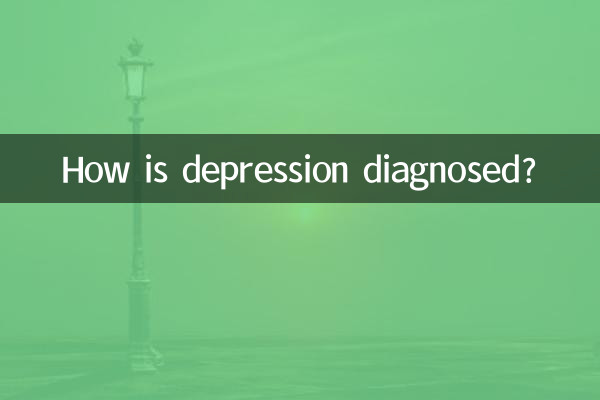How is depression diagnosed?
Depression is a common mental health problem that has attracted global attention in recent years. As social pressure increases, the incidence of depression is also increasing year by year. So, how is depression diagnosed? This article will give you a detailed analysis of the diagnostic methods of depression based on hot topics and hot content on the Internet in the past 10 days.
1. Common symptoms of depression

The symptoms of depression vary. Here are some common ones:
| Symptom type | Specific performance |
|---|---|
| emotional symptoms | Persistent low mood, loss of interest in things, feelings of hopelessness or self-blame |
| physical symptoms | Insomnia or drowsiness, changes in appetite, fatigue, or lack of energy |
| cognitive symptoms | Difficulty concentrating, memory loss, and decision-making difficulties |
| behavioral symptoms | Social withdrawal, decreased activity, self-harm, or suicidal thoughts |
2. Diagnostic Methods of Depression
The diagnosis of depression usually requires evaluation by a professional doctor. The following are common diagnostic methods:
| diagnostic methods | Specific content |
|---|---|
| clinical interview | Doctors interview patients to understand their symptoms, duration and impact on their lives |
| psychological scale | Use standardized questionnaires (such as PHQ-9, HAMD) to assess depression levels |
| Physical examination | Rule out other conditions that may cause similar symptoms (such as thyroid dysfunction) |
| laboratory tests | Blood tests, hormone level testing and other auxiliary diagnostics |
3. Screening tools for depression
Here are some commonly used depression screening tools and their characteristics:
| Tool name | Applicable people | Number of questions |
|---|---|---|
| PHQ-9 | adult | 9 questions |
| BDI | Teenagers and adults | 21 questions |
| CES-D | general population | 20 questions |
| HADS | hospital patient | 14 questions |
4. Diagnostic criteria for depression
According to the Diagnostic and Statistical Manual of Mental Disorders (DSM-5), the following conditions must be met to diagnose depression:
| Standard | Specific requirements |
|---|---|
| number of symptoms | At least 5 core symptoms (such as depression, loss of interest, etc.) |
| duration | Symptoms persist for at least 2 weeks |
| Functional impact | Symptoms cause significant impairment in social, occupational, or other important areas of functioning |
| Exclusion criteria | Symptoms not directly caused by medication, other illness, or bereavement |
5. How to self-assess depression
If you suspect that you or someone else may be suffering from depression, you can take the following steps to conduct an initial self-assessment:
1.Watch for symptoms: Record whether recent changes in mood and behavior are consistent with common symptoms of depression.
2.Use screening tools: Complete standardized questionnaires such as PHQ-9 to understand the level of depression.
3.Seek professional help: If symptoms persist or seriously affect your life, it is recommended to consult a psychologist or psychiatrist as soon as possible.
6. Misunderstandings and truths about depression
There are some common misunderstandings about the diagnosis of depression:
| Misunderstanding | truth |
|---|---|
| Depression is "thinking too much" | Depression is a disease and has nothing to do with personality |
| Depression cannot be diagnosed | Diagnosis can be confirmed through professional evaluation |
| Only severe depression requires treatment | Mild depression should also be intervened as early as possible |
7. Treatment and support for depression
Diagnosis of depression is only the first step; subsequent treatment and support are equally important:
1.psychotherapy: Psychological interventions such as cognitive behavioral therapy (CBT) have significant effects on depression.
2.drug treatment: Antidepressant drugs can help relieve symptoms and should be used under the guidance of a doctor.
3.social support: Understanding and support from family and friends are crucial to recovery.
4.lifestyle adjustments: Regular work and rest, moderate exercise, and healthy diet can help improve your mood.
Conclusion
The diagnosis of depression is a systematic process that requires a combination of factors such as symptoms, duration, and functional impact. If you or someone close to you is experiencing symptoms of depression, please seek professional help promptly. Depression is treatable, and early diagnosis and intervention can significantly improve the likelihood of recovery.

check the details

check the details